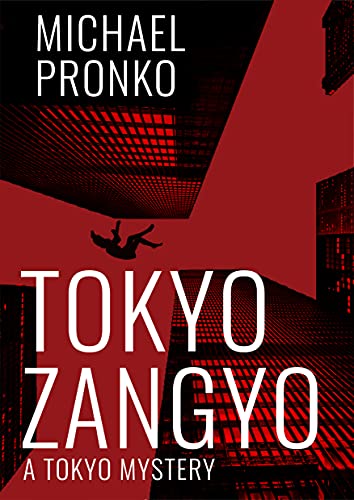Tokyo Zangyo received a 4+ star review, making it an IndieReader Approved title.
Following find an interview with author Michael Pronko.
What is the name of the book and when was it published?
Tokyo Zangyo, published July 30, 2021.
What’s the book’s first line?
“Shigeru Onizuka woke up shivering, naked, on the roof of his company building.”
What’s the book about? Give us the “pitch.”
Detective Hiroshi is investigating the death of a hard-driving businessman who fell from his company’s twenty-story building. It seems a suicide, until Hiroshi finds out he fell from the exact same spot as one of his former employees who killed herself. Hiroshi and his mentor Takamatsu soon find there is a lot more to the story than just suicide. The word ‘zangyo’ means overtime work, usually unpaid. It’s a brutal system for Japan’s workers, especially for women, and for detectives, too. Hiroshi digs into the depths of the corporate world and finds the source of its brutal efficiency.
What inspired you to write the book? A particular person? An event?
Only in Japan is there a word, ‘karoshi,’ for death from overwork. On Tokyo trains, I see in the exhaustion on the faces of workers on the train. They fall asleep, stare listlessly at their cellphones, drink too much, walk in a daze. I also have listened to stories from my former students who have entered Japanese companies. Work takes over their lives. Some of their stories are startling, just work and more work, no chance to have a life. Listening to their stories, I often feel aghast at what they’re asked to do. And of course, in the media, there’s been many shocking reports of cases of suicide from overwork and harassment. They report on some terrible incident, and then move on, but it’s an ongoing problem. Ezra Pound said, “Literature is news that stays news.”
What’s the main reason someone should really read this book?
Fiction is one of the best ways to get deeper into a culture. Before I travel, or when I can’t travel, I read novels to see things from the way characters from another place think and feel. It’s fascinating to see why people do what they do. This novel is about the pressures of the workplace and that’s something almost everyone can relate to. This is also a fast-paced story that covers a lot of ground in Tokyo and goes inside to look at what we often don’t see.
What’s the most distinctive thing about the main character? Who-real or fictional-would you say the character reminds you of?
The main character, Hiroshi, is a reluctant detective. He’s rather normal, without any horrible backstory, but still has a set of unresolved issues just the same. He is actually an accountant who’s fluent in English and has lived outside of Japan for many years, which gives him a bit of an outsider’s point of view. He gets the job because Japan’s white-collar crimes have increased and internationalized. As his boss says, murder is always connected to money.
What do you do for work when you’re not writing?
I’m a professor of American literature at Meiji Gakuin University in Tokyo. Needless to say, that takes time away from writing, but it also helps my writing. If I’m teaching a Buster Keaton film, then I’m looking at the elegance and perfection of story structure. If I’m teaching an e.e. cummings poem, then I’m learning about the power and mystery of language. All of that feeds into how I write, from structure and language to character and conflict. Students have some fascinating insights into literature, which always makes me rethink my understanding. Some days, of course, I’m ready to retire, but other days, after class I race to write down an insight or new point of view I got during class.
How much time do you generally spend on your writing?
As much as I can. I wish I could work faster, but I get done whatever I can in and around the full-time university gig. There are breaks between semesters, so I can sketch out the big picture of the novels then, giving it ample time and room to grow. Then, during the semester, I squeeze in seven or eight two-to-three-hour blocks of time for writing. I used to write for newspapers and magazines, which means hard deadlines. So, I got used to focusing and getting something done inside narrow timeframes. The train is a great place to think in Tokyo, and I always get writing ideas then, too.
What’s a great piece of advice that you can share with fellow indie authors?
One thing that’s helped me immensely is to outline novels and films. I do that on paper as I read or watch, and in great detail. Having done that for many years as preparation for teaching my seminars, I realized I was teaching myself a lot about novel writing at the same time. I also take a lot of notes on the parts of the novel. It’s a sort of dissection, part by part, but it’s also a way of finding the flow, the interconnections. By writing down the elements and dynamics of a novel, you can start to see how it really works, or doesn’t. Outlining great novels has been immensely helpful to my writing.

